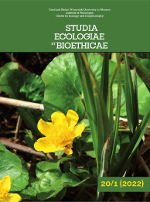Using the Knowledge Acquired During Studies in Shaping Attitudes Towards Sustainable Development
Using the Knowledge Acquired During Studies in Shaping Attitudes Towards Sustainable Development
Author(s): Małgorzata Jagodzińska, Anna Strumińska-DoktórSubject(s): Environmental and Energy policy, Adult Education, Higher Education
Published by: Wydawnictwo Naukowe Uniwersytetu Kardynała Stefana Wyszyńskiego w Warszawie
Keywords: education;sustainable development;social and natural education
Summary/Abstract: Thanks to active education for sustainable development at universities, it is possible to prepare teachers ready to educate future generations of Polish learners on the one hand, and conscious economists, as well as political and social decision-makers able to introduce the principles of sustainable development in all spheres of human life, on the other. The aim of the research was to find out about the opinions of Polish students on how the knowledge acquired by them during their studies may shape their attitudes towards sustainable development. The research instruments used were a diagnostic survey method, with the help of the questionnaire technique. The research sample comprised 78 students representing the field of pedagogy studies, including 61.5% in the area of teacher studies (preschool and early school education) and 38.5% in the area of non-teaching studies (i.e., students without pedagogical qualifications, that is, educators who do not follow the core curriculum of general education[1]; such graduates perform educational and caring functions). A large percentage of respondents confirms the presence of the content related to sustainable development in their study programs, although its implementation is reported to occur to a small extent (marginally) only. The respondents who take into account the issues of sustainable development are involved to a greater extent in teacher education within the field of preschool and early school education. As part of the training activities for future teachers of kindergartens and primary school, grades 1-3, the teaching content has been integrated (with a module of socio-natural education being separated) that contains detailed learning outcomes evidently subordinated to the content of sustainable development. Although a clear difference in the use of knowledge in this area between students of teaching and non-teaching fields of study can be observed, it is still necessary to include the sustainable development related knowledge in the curricula of various study subjects, which will certainly affect the development of social capital, and thus education of people socially and environmentally responsible for their actions.
Journal: Studia Ecologiae et Bioethicae
- Issue Year: 20/2022
- Issue No: 1
- Page Range: 39-52
- Page Count: 14
- Language: English

